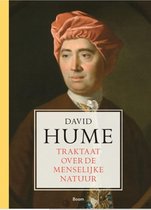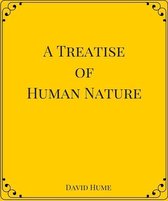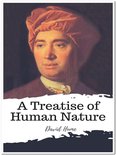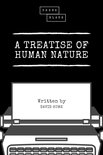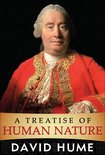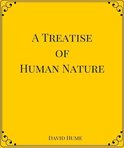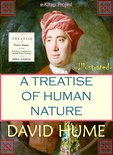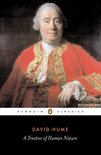A Treatise of Human Nature: Being an Attempt to Introduce the Experimental Method into Moral Subjects Ebook Tooltip Ebooks kunnen worden gelezen op uw computer en op daarvoor geschikte e-readers.
Afbeeldingen
Artikel vergelijken
- Engels
- E-book
- 9781613105948
- 16 maart 2020
- -57499
David Hume
(Bron: Wikipedia. Beschikbaar onder de licentie Creative Commons Naamsvermelding/Gelijk delen.)"
Samenvatting
There is a view of the history of mankind, by this time familiarised to Englishmen, which detaches from the chaos of events a connected series of ruling actions and beliefs—the achievement of great men and great epochs, and assigns to these in a special sense the term ‘historical.’ According to this theory—which indeed, if there is to be a theory of History at all, alone gives the needful simplification—the mass of nations must be regarded as left in swamps and shallows outside the main stream of human development. They have either never come within the reach of the hopes and institutions which make history a progress instead of a cycle, or they have stiffened these into a dead body of ceremony and caste, or at some great epoch they have failed to discern the sign of the times and rejected the counsel of God against themselves. Thus permanently or for generations, with no principle of motion but unsatisfied want, without the assimilative ideas which from the strife of passions elicit moral results, they have trodden the old round of war, trade, and faction, adding nothing to the spiritual heritage of man. It would seem that the historian need not trouble himself with them, except so far as relation to them determines the activity of the progressive nations. A corresponding theory may with some confidence be applied to simplify the history of philosophical opinion. The common plan of seeking this history in compendia of the systems of philosophical writers, taken in the gross or with no discrimination except in regard to time and popularity, is mainly to blame for the common notion that metaphysical enquiry is an endless process of threshing old straw. Such enquiry is really progressive, and has a real history, but it is a history represented by a few great names. At rare epochs there appear men, or sets of men, with the true speculative impulse to begin at the beginning and go to the end, and with the faculty of discerning the true point of departure which previous speculation has fixed for them. The intervals are occupied by commentators and exponents of the last true philosopher, if it has been his mission to construct; if it has been sceptical, by writers who cannot understand the fatal question that he has asked, and thus still dig in the old vein which he had exhausted, and of which his final dilemma had shown the bottom. Such an interval was that which in the growth of continental philosophy followed on the epoch of Leibnitz; an interval of academic exposition or formulation, in which the system, that had been to the master an incomplete enquiry, became in the hands of his disciples a one-sided dogmatism. In the line of speculation more distinctively English, a like régime of ‘strenua inertia’ has prevailed since the time of Hume. In the manner of its unprofitableness, indeed, it has differed from the Wolfian period in Germany, just as the disinterested scepticism of Hume differed from the system-making for purposes of edification to which Leibnitz applied himself. It has been unprofitable, because its representatives have persisted in philosophising upon principles which Hume had pursued to their legitimate issue and had shown, not as their enemy but as their advocate, to render all philosophy futile. Adopting the premises and method of Locke, he cleared them of all illogical adaptations to popular belief, and experimented with them on the body of professed knowledge, as one only could do who had neither any twist of vice nor any bias for doing good, but was a philosopher because he could not help it.
Productspecificaties
Inhoud
- Taal
- en
- Bindwijze
- E-book
- Oorspronkelijke releasedatum
- 16 maart 2020
- Ebook Formaat
- -57499
- Illustraties
- Nee
Betrokkenen
- Hoofdauteur
- David Hume
- Tweede Auteur
- David Hume
- Co Auteur
- Thomas H Grose
- Hoofdillustrator
- Murat Ukray
- Hoofdredacteur
- The Perfect Library
- Tweede Redacteur
- Stuart E. Rosenbaum
- Hoofduitgeverij
- Library Of Alexandria
Vertaling
- Originele titel
- A Treatise of Human Nature
Lees mogelijkheden
- Lees dit ebook op
- Android (smartphone en tablet) | Kobo e-reader | Desktop (Mac en Windows) | iOS (smartphone en tablet) | Windows (smartphone en tablet)
Overige kenmerken
- Primaire Productiemaatschappij
- Clarendon Pr Oxford
- Studieboek
- Nee
EAN
- EAN
- 9781613105948
Je vindt dit artikel in
- Categorieën
- Boek, ebook of luisterboek?
- Ebook
- Taal
- Engels
- Beschikbaarheid
- Leverbaar
- Beschikbaar in Kobo Plus
- Beschikbaar in Kobo Plus
Waarom een wereldbollabel?
Artikelen met een wereldbol bezitten positieve eigenschappen vergeleken met soortgelijke artikelen, zoals bepaalde keur- of kenmerken op sociaal en ecologisch gebied.
Keur- of kenmerken
-
Digitaal boek
Onafhankelijk onderzoek toont aan dat als je meer dan 25 ebooks downloadt, dit een lagere milieuimpact heeft dan van fysieke boeken.
Kies gewenste uitvoering
Prijsinformatie en bestellen
De prijs van dit product is 4 euro en 99 cent.- E-book is direct beschikbaar na aankoop
- E-books lezen is voordelig
- Dag en nacht klantenservice
- Veilig betalen
Alle bindwijzen en edities (24)
-
4,99Direct beschikbaar
-
2,99Direct beschikbaar
-
0,97Direct beschikbaar
-
2,13Direct beschikbaar
-
1,99Direct beschikbaar
-
2,99Direct beschikbaar
-
2,99Direct beschikbaar
-
0,99Direct beschikbaar
-
2,99Direct beschikbaar
-
1,99Direct beschikbaar
-
1,99Direct beschikbaar
-
2,94Direct beschikbaar
-
0,99Direct beschikbaar
-
2,99Direct beschikbaar
-
5,99Direct beschikbaar
-
3,99Direct beschikbaar
-
2,99Direct beschikbaar
-
0,97Direct beschikbaar
-
2,23Direct beschikbaar
-
9,77Direct beschikbaar
-
8,99Direct beschikbaar
-
11,99Direct beschikbaar
-
14,992 - 3 weken
Levertijd
We doen er alles aan om dit artikel op tijd te bezorgen. Het is echter in een enkel geval mogelijk dat door omstandigheden de bezorging vertraagd is.
Bezorgopties
We bieden verschillende opties aan voor het bezorgen of ophalen van je bestelling. Welke opties voor jouw bestelling beschikbaar zijn, zie je bij het afronden van de bestelling.
Tooltip -
69,07Uiterlijk 11 mei in huis
Levertijd
We doen er alles aan om dit artikel op tijd te bezorgen. Het is echter in een enkel geval mogelijk dat door omstandigheden de bezorging vertraagd is.
Bezorgopties
We bieden verschillende opties aan voor het bezorgen of ophalen van je bestelling. Welke opties voor jouw bestelling beschikbaar zijn, zie je bij het afronden van de bestelling.
Tooltip
Rapporteer dit artikel
Je wilt melding doen van illegale inhoud over dit artikel:
- Ik wil melding doen als klant
- Ik wil melding doen als autoriteit of trusted flagger
- Ik wil melding doen als partner
- Ik wil melding doen als merkhouder
Geen klant, autoriteit, trusted flagger, merkhouder of partner? Gebruik dan onderstaande link om melding te doen.



